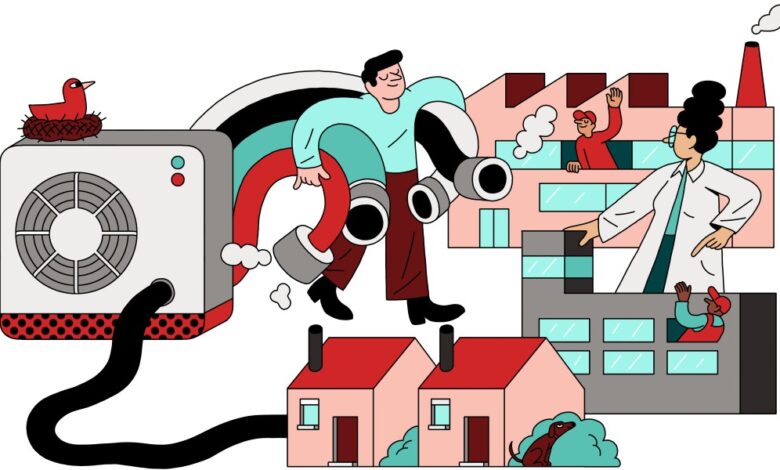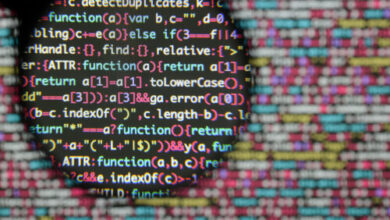The Download: heat pumps, and getting drugs to the brain

Plus: Microsoft was briefly the world’s most valuable company
This is today’s edition of The Download, our weekday newsletter that provides a daily dose of what’s going on in the world of technology.
Heat pumps: 10 Breakthrough Technologies 2024
We’ve entered the era of the heat pump. Heat pumps are appliances that can cool and heat spaces using electricity. Many buildings today are still heated with fossil fuels, specifically natural gas. Switching to electric heat pumps that run on renewable energy could help them to cut their emissions dramatically.
While heat pumps have been used in buildings since the mid-20th century, the technology is breaking through in a new way. New approaches are enabling them to reach higher temperatures, which could allow the technology to help clean up industrial manufacturing. However, there are still big challenges ahead. Read the full story.
—Casey Crownhart
Heat pumps are one of MIT Technology Review’s 10 Breakthrough Technologies for 2024. Check out the rest of the list and vote for the final 11th breakthrough—we’ll reveal the winner in April.
If you’re interested in heat pumps, why not check out these other pieces by Casey:
+ Everything you need to know about the wild world of heat pumps. They’re the hottest home appliance, shoved into the spotlight by the potential for cost savings and climate benefits, as well as by recent policy incentives. Read the full story.
+ The surprising truth about which homes have heat pumps. The appliances buck a common climate technology trend in the US—for now. Read the full story.
The innovation that gets an Alzheimer’s drug through the blood-brain barrier
Therapies to treat brain diseases share a common problem: they struggle to reach their target. The blood vessels that permeate the brain have a special lining so tightly packed with cells that only very tiny molecules can pass through. This blood-brain barrier acts like a seal, protecting the brain from toxins or other harmful substances. But it also keeps most medicines out.
Researchers have been working on methods to sneak drugs past the blood-brain barrier for decades. And their hard work is finally beginning to pay off. Read the full story.
—Cassandra Willyard
This story is from The Checkup, our weekly biotech newsletter. Sign up to receive it in your inbox every Thursday.
The must-reads
I’ve combed the internet to find you today’s most fun/important/scary/fascinating stories about technology.
1 Microsoft briefly usurped Apple as the world’s most valuable company
The AI boom has investors laughing all the way to the bank. (FT $)
+ Microsoft is growing more quickly than its old rival. (Reuters)+ But Apple quickly regained its position—for now. (WSJ $)
2 The unlucky Peregrine moon lander is still collecting data
It didn’t make it to the moon, but that doesn’t mean it isn’t making itself useful. (The Verge)
3 US school shooter plans have been leaked online
The highly sensitive emergency documents were exposed in a database leak. (Wired $)
4 China’s cheap electric cars has the West rattled
They’re fast, they look good—and most importantly, they’re cheap. (Economist $)
+ Rental firm Hertz is selling off 20,000 EVs due to low demand. (Bloomberg $)
+ Europe’s best-selling Chinese EV maker has a surprising name. (MIT Technology Review)
5 Duolingo is firing human translators in favor of AI
A former worker says errors are creeping into language courses as a result. (WP $)
+ Chatbots, chatbots, everywhere. (Vox)
+ This company is building AI for African languages. (MIT Technology Review)
6 eBay has been fined for harassing a Massachusetts couple
The pair ran a newsletter for online merchants that rubbed eBay executives up the wrong way.(The Guardian)
7 Even the blockchain is pivoting to AI
But whether the two technologies can really solve each other’s problems remains to be seen. (WSJ $)
8 Smart locks are a technical nightmare
I just want to get into my apartment! (NY Mag $)
9 The first text messages sent via Starlink satellite have been delivered
Referencing a decade-old meme, naturally. (Ars Technica)
10 The barcode is slowly dying
But its most probable replacement is already looking outdated. (The Atlantic $)
Quote of the day
“I’ve seen better acting by hostages in direct to DVD movies.”
—An anonymous WebMD employee reacts to a cringe-inducing video the company’s parent firm made demanding employees return to the office, Motherboard reports.
The big story
The Atlantic’s vital currents could collapse. Scientists are racing to understand the dangers.

December 2021
Scientists are searching for clues about one of the most important forces in the planet’s climate system: a network of ocean currents known as the Atlantic Meridional Overturning Circulation. They want to better understand how global warming is changing it, and how much more it could shift, or even collapse.
The problem is the Atlantic circulation seems to be weakening, transporting less water and heat. Because of climate change, melting ice sheets are pouring fresh water into the ocean at the higher latitudes, and the surface waters are retaining more of their heat. Warmer and fresher waters are less dense and thus not as prone to sink, which may be undermining one of the currents’ core driving forces. Read the full story.
—James Temple
We can still have nice things
A place for comfort, fun and distraction in these weird times. (Got any ideas? Drop me a line or tweet ’em at me.)
+ There’s nothing Italians love more than imposing a food rule.
+ Maybe we should all move to Vienna.
+ These easy sheet pan recipes look both delicious and nutritious.
+ To capture birds in flight, you really have to put in the hours.
+ Is Amaro the drink of 2024 (already?)




